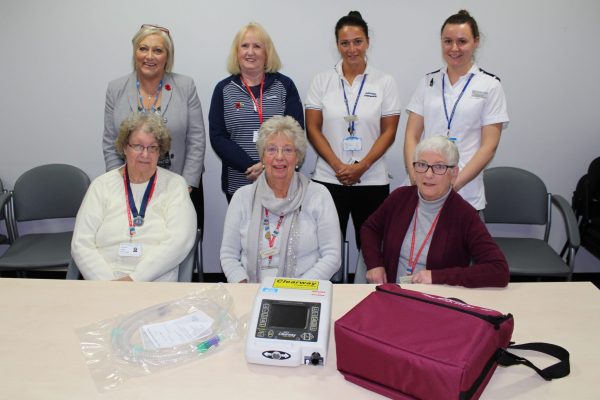Patients with respiratory conditions at Walsall Manor Hospital will now be supported with the latest technology thanks to a kind donation from the League of Friends volunteers.
The League of Friends, an organisation who work to enhance patient experience and raise funds for things over and above what the NHS can provide, have donated a Nippy Clearway cough assistor to Walsall Healthcare’s Respiratory Physiotherapy Team in the hope that it will help patients who are unable to cough up the secretions in their lungs.
Respiratory Physiotherapist Michelle Collins explained: “Whether the patient has been admitted into hospital with a chest infection or has a problem with the nervous system that hinders their ability to cough – this machine will work to prevent those patients from developing life threatening complications such as pneumonia, which can then lead to multiple organ failure.
“Patients who can’t clear their secretions are at risk, but by using this equipment we will be able to prevent them from deteriorating; this in turn should prevent an admission onto the intensive care unit.”
The machine, which cost over £3000, works by placing a mask over the mouth of the patient and inflating the lungs; the air is then drawn back out to make the patient cough and bring up the secretions.
In the past, neurological patients or those with weak respiratory muscles would require more invasive methods, such as deep suction via tubes.
Izabela Forys, also a Respiratory Physiotherapist, said: “Deep suction can often be quite uncomfortable, so using the cough assistor will give the patients a better experience, prevent infection risks associated with deep suction and will be clinically more efficient.”
Aware that the League of Friends had helped other services by purchasing innovative pieces of equipment, the team approached the group to help fund the cough assistor.
Janet Hodson, League of Friends Chairman, said: “We were happy to help! We are really pleased that this machine will be able to make the patients more comfortable while receiving their treatment.”
For the poorliest of patients, it’s expected that the machine will be used up to three times a day for about a week, with half an hour treatments each time.
Michelle added: “As we approach the winter season, we can expect lots of admissions with people requiring treatment for chest infections and pneumonias.
“This machine will mean speedier treatment and speedier recovery – this will hopefully reduce the length of stay for our patients and will free up beds for other critically ill patients.”

